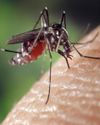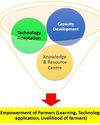
First Krishi Vigyan Kendra was established in March 21, 1974 at Pondicherry by Indian Council of Agriculture Research, New Delhi in light of recommendations laid by Dr. Mohan Singh Mehta Committee. With the approval of planning commission, ICAR initiated 18 KVKS during the fifth five year plan (1974-79). In the Independence Day speech on August 15, 2005, the then Prime Minister of India stated that by the end of 2007, there would be one KVK in each rural district. Currently there are total 731 KVKS (one in each district; some district also possess 2 KVKS) across the nation. These KVKS are administered by ICAR, SAU, NGOs, and other agencies. Initially it was opened solely for providing training in frontier areas of agriculture and now it assists in providing vocational training to field-level extension workers, school dropouts, and farmers in practice.
KVK staff includes experts/subject matter specialists (SMS)/scientists from various disciplines of agriculture and allied sciences, along with supporting staffs. They train male and female farmers and youths related to the areas of their interest. These trainings are of different nature like vocational, one day thematic trainings, etc. In addition to these, SMS act as trainers for other extension functionaries working in the field level. KVK has been responsible for playing a pivotal role in improving the socio-economic conditions of farmers in the unreached rural areas.
Mandates of KVK:
KVKs plays a critical role in the refinement of technologies for specific situations and locations by serving as a two-way link between research and farmers.
The KVKs' primary mandate is technology assessment, refinement, and demonstration for adoption. On-Farm Testing (OFT) evaluates the location-specificity of agricultural technology across diverse farming systems.
This story is from the July-August 2024 edition of Scientific India.
Start your 7-day Magzter GOLD free trial to access thousands of curated premium stories, and 9,000+ magazines and newspapers.
Already a subscriber ? Sign In
This story is from the July-August 2024 edition of Scientific India.
Start your 7-day Magzter GOLD free trial to access thousands of curated premium stories, and 9,000+ magazines and newspapers.
Already a subscriber? Sign In

An insight into Chandipura virus in India
Recently lot of news regarding disease due to Chandipura virus has emerged in various newspapers/magazines. After reading the reports published it seems that thing is still brewing in the natures nest and it could affect mankind.

Why elephants never forget?
An elephant has a very large brain for its size and the 'temporal lobe' region responsible for memory is more developed with a greater number of folds - this results in powerful abilities to 'download' important survival data such as where to find food and water, and who is friend or foe.

Use of Algae for Wastewater Treatment Containing Heavy Metals
Wastewater treatment is a critical environmental issue particularly when it comes to the removal of heavy metals.

Nano priming Seeds: A Small Innovation Sparkling Big Advances in Germination
Nanopriming is an emerging agricultural technique where the seeds are treated with nanoparticles to improve their germination, growth, and overall performance.

Nobel Laureates in Physics 2024: Revolutionizing AlThe Physics Foundations Behind Machine Learning
This year's two Nobel Laureates in Physics have used tools from physics to develop methods that are the foundation of today's powerful machine learning.

Revolutionizing Biology: The 2024 Nobel Prize in Chemistry Celebrates Breakthroughs in Protein Design and Structure Prediction
The Nobel Prize in Chemistry 2024 is about proteins, life's ingenious chemical tools.

New findings on animal viruses with potential to infect humans
Scientists investigating animal viruses with potential to infect humans have identified a critical protein that could enable spillover of a family of organisms called arteriviruses.

Father-Daughter Team Decodes Mars' Alien Signal
There is no definitive answer to whether aliens exist, but there is a lot of work being done to find out:

Krishi Vigyan Kendras: Working for Farmer's Welfare
Krishi Vigyan Kendras (Farm Science Centres) are the District level institution serving as an agriculture knowledge resource & capacity development centre which plays indispensable role in front line extension regarding agriculture system in scientific way.

Sixth generation Computer: The future computing technology
We are in a transition towards a digital world, where everything will be dealt with in digital format.